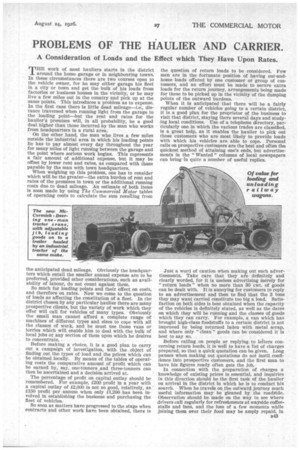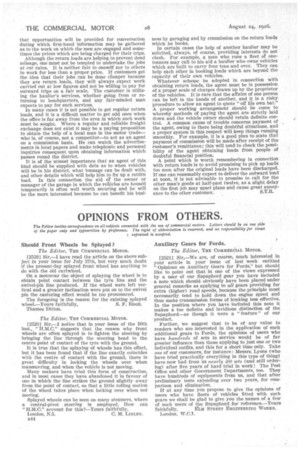PROBLEMS OF THE HAULIER AND CARRIER.
Page 61

Page 62

If you've noticed an error in this article please click here to report it so we can fix it.
A Consideration of Loads and the Effect which They Have Upon Rates.
THE work of most hauliers starts in the district around the home garage or in neighbouring towns. In these circumstances there are two courses open to the vehicle owner, for he may either garage his fleet in a city or town and get the bulk of his loads from factories or business houses in the vicinity, or he may live a few miles out in the country and pick up at the same points. This introduces a problem as to expense. In the first case there is little dead mileage—i.e., distance traversed when running light from the garage to the loading point—but the rent and rates for the haulier's premises will, in all probability, be a good deal higher than those incurred by the man who works from headquarters in a rural area.
On the other hand, the man who lives a few miles outside the industrial area in which his loading points lie has to pay almost every day throughout the year for many miles of light running between the garage and the point where serious work begins. This represents a fair amount of additional expense, but it may be offset by lower rent and rates, as compared with those payable by the man with town headquarters.
When weighing up this problem, one has to consider which will be the greater—the extra burden of rent and rates of the premises in town or the additional running costs due to dead mileage. An estimate of both items is soon made by using The Commercial Motor tables of operating costs to calculate the sum resulting from the anticipated dead mileage. Obviously the headquarters which entail the smaller annual expense are to be preferred, provided other considerations, such as availability of labour, do not count against them.
So much for loading points and their effect on costs, and therefore ou rates. Now we come to the question of loads as affecting the constitution of a fleet. In the district chosen by any particular haulier there are many prospective clients, but the variety of work which they offer will call for vehicles of many types. Obviously the small man cannot afford a complete range of machines of different types and sizes to cope with all the classes of work, and he must use those vans or lorries which will enable him to deal with the bulk of local jobs or any section of them upon which he desires to concentrate.
Before making a choice, it is a good plan to carry out a campaign of investigation, with the object of finding out the types of load and the prices which can be obtained locally. By means of the tables of operating costs the comparative amount of profit which can be earned by, say, one-tonners and three-tonners can then be ascertained and a decision arrived at.
The percentage of profit on capital outlay should be remembered. For example, 1200 profit in a year with a capital outlay of 12,000 is not so good, relatively, as 1150 profit per annum when only 11,200 has been involved in establishing the business and purchasing the fleet of vehicles.
So soon as matters have progressed to the stage when contracts and other work have been obtained, there is the question of return loads to be considered. Few men are in the fortunate position of having out-andhome loads offered by one customer or group of customers, and an effort must be made to secure extra loads for the return journey, arrangements being made for these to be picked up in the vicinity of the dumping points of the outward burdens.
When it is anticipated that there will be a fairly regular number of vehicles going to a certain district, it is a good plan for the proprietor of the business to visit that district, staying there several days and studying local conditions. 'CJse of a telephone directory, particularly one in which the various trades are classified, is a great help, as it enables the haulier to piek out those customers who are most likely to provide loads with which his vehicles are able to cope. Personal calls on prospective customers are the best and often the quickest method of attaining one's ends, but advertisements in the " Wanted " columns of local newspapers can bring in quite a number of useful replies.
Just a word of caution when making out such advertisements. Take care that they are definitely and clearly worded, for it is useless advertising Merely for "return loads" when no more than 30 cwt. of goods can be dealt with, It is annoying for customers to reply to an advertisement and then to find that the 3 tons they may want carried constitute too big a load. Satisfaction on both sides is best obtained when the capacity of the vehicles is definitely stated, as well as the dates on which they will be running and the classes of goods which they can carry. For example, a van which has brought high-class foodstuffs to a certain district is not improved by being returned laden with metal scrap, and where only " clean " goods can be considered it is best to say so.
Before calling on people or replying to letters concerning return loads, it is well to have a list of charges prepared, so that a quick quotation can be given. Long pauses when making out quotations do not instil confidence into prospective Customers, and the first man to have his figures ready often gets the job.
• In connection with the preparation of charges a knowledge of existing prices is essential, and inquiries in this direction should be the first task of the haulier on arrival in the district in which he is to conduct his search. When he travels on the outward journey much useful information may be gleaned by the roadside. Observation should be made on the way to see where drivers call regularly for refreshments at wayside coffeestalls and inns, and the loss of a few moments while joining them over their food may be amply repaid, in that opportunities will be provided for conversation during which first-hand information may be gathered as to the work on which the men are engaged and sometimes the prices which are being charged for their trips.
Although the return loads are helping to prevent dead mileage, one must not be tempted to undertake the jobs at cut rates. It is neither fair to oneself nor to others to work for less than a proper price. If customers get the idea that their jobs can be done cheaper because they are return loads, they will always expect work carried out at low figures and not be willing to pay for outward trips on a fair scale. The customer is utilizing the haulier's services, whether going from or returning to headquarters, and any fair-minded man expects to pay for such services.
In many cases it is not possible to get regular return loads, and it is a difficult matter to get odd ones when the office is far away from the area in which such work must be sought. Where a regular and reliable freight exchange does not exist it may be a paying proposition to obtain the help of a local man in the motor trade— who is, of course, not a competitor—to act as an agent on a commission basis. He can watch the advertisements in local papers and make telephonic and personal inquiries consequent upon obtaining information which passes round the district.
It is of the utmost importance that an agent of this kind should be supplied with data as to when vehicles will be in his district, what tonnage can be dealt with, and other details which will help him to fix up a return load. In this connection the aid of the owner or manager of the garage in which the vehicles are housed temporarily is often well worth securing and he will be the more interested because he can benefit his busi ness by garaging and by commission on the return loads which he books.
In certain cases the help of another haulier may be solicited, always, of course, providing interests do not clash. For example, a man who runs a fleet of onetonners may call to his aid a haulier who owns vehicles which are built to carry four tons and over. They can help each other in booking loads which are beyond the capacity of their own vehicles.
Whatever scheme be adopted in connection with obtaining return loads, the agent must be in possession of a proper scale of charges drawn up by the proprietor of the vehicles. It is rare that the affairs of one person can be left in the hands of another, and it is a risky procedure to allow an agent to quote "off his own bat." A proper working arrangement should be come to whereby methods of paying the agent are strictly laid down and the vehicle owner should retain definite control. A common cause of trouble concerns payment of the agent, owing to there being doubtful situations, and a proper system in this respect will keep things running smoothly. For example, it is a good plan to state that payment of commission will be made after receipt of the customer's remittance; this will tend to check the possibility of the agent obtaining loads from people a doubtful financial position.
A point which is worth remembering in connection with return loads is to avoid promising to pick up loads too soon after the original loads have been discharged. If one can reasonably expect to deliver the outward load at noon, it is not advisable to promise to call for the other man's goods at half-past twelve, as a slight delay on the first job may upset plans and cause great annoy ance to the other customer. S.T.R.




































































































